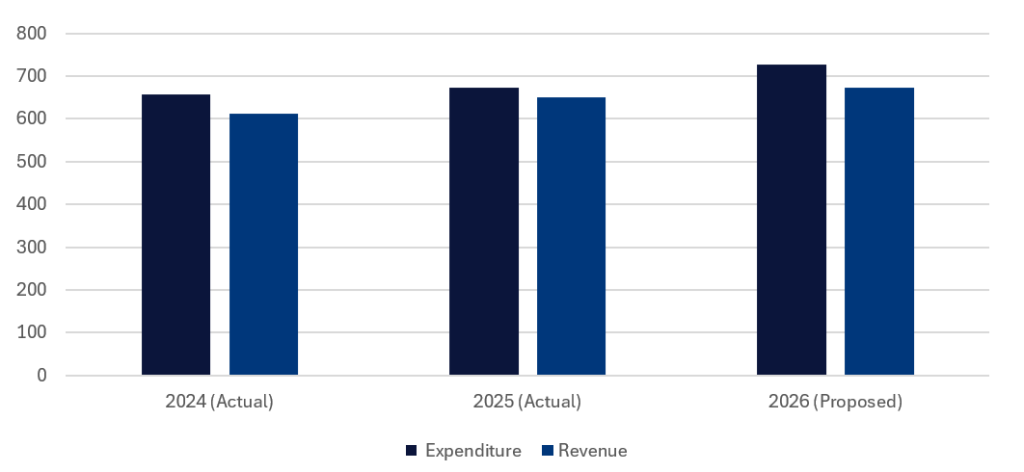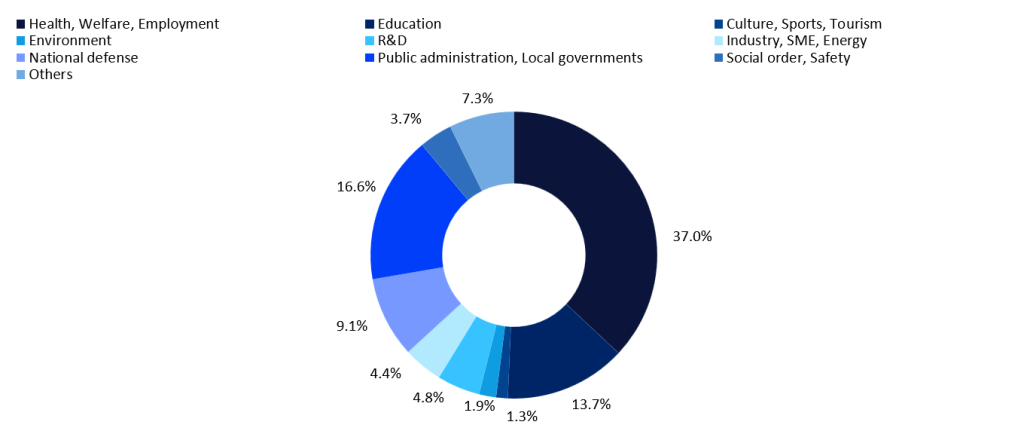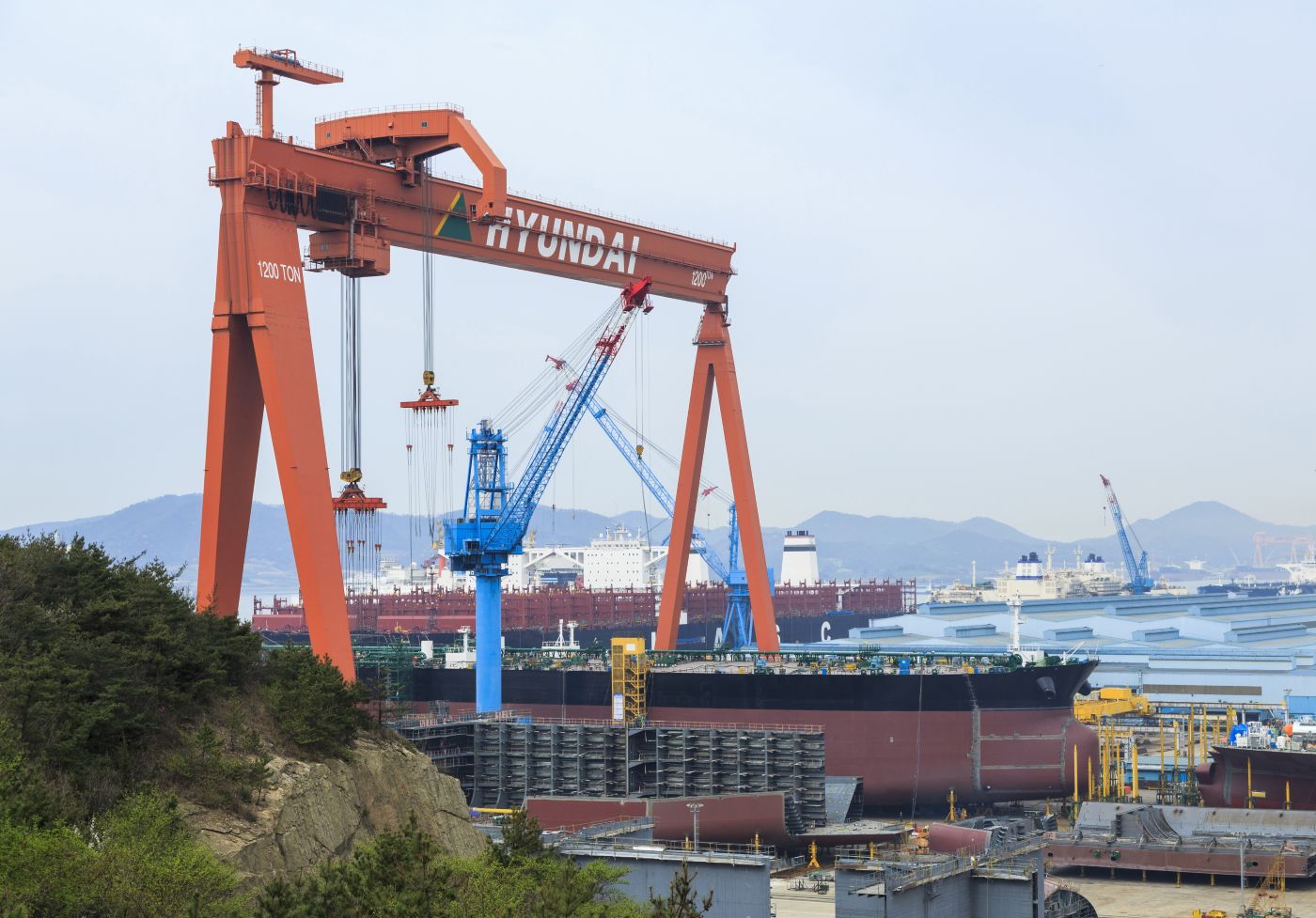The national budget for 2026 was presented to the cabinet on 3 September 2025. The national budget proposal for South Korea in 2026 is set at WON728tn ($542.2bn), marking an 8.1% increase from the WON673tn ($501.2bn) budget of the current year and surpassing the WON700tn ($521.3bn) mark for the first time in history. The revenue is estimated at WON674.2tn ($502.1bn), marking an increase of 3.5% compared to the 2025 Budget. The budget focuses on fostering a technology-driven and hyper-innovative economy, strengthening fundamental social growth, and enhancing diplomacy and national security. The budget bill will be submitted to the National Assembly for approval, expected by December 2025. This budget reflects the President Lee Jae-myung administration’s strategic goal of positioning Korea as a global leader in innovation and economic development.
South Korea: government revenue and expenditure, in WON (tn)

Some of the major allocations are WON269.1tn ($200.4bn) for the Ministry of Health, Welfare, and Employment, WON121.1tn ($90.2bn) for the Ministry of Public administration, local governments; WON99.8tn ($74.3bn) for the Ministry of Education; WON66.3tn ($49.4bn) for the Ministry of National Defence; WON32.2tn ($24bn) for the Ministry of Industry, SME, Energy; WON14tn ($10.4bn) for the Ministry of Environment, and WON9.6tn ($7.1bn) for the Ministry of Culture, Sports, Tourism.
The government also plans to invest WON10.1tn ($7.5bn) in the AI sector in 2026, representing more than a threefold increase compared to the previous year. It will invest approximately WON6tn ($4.5bn) by 2030 in key industrial sectors such as robotics, automobiles, shipbuilding, and manufacturing to establish regional hubs for AI transformation. It will inject approximately WON100bn ($74.5m) into 24 AI/AX graduate schools, and WON1tn ($744.8m) will go into a new National Growth Fund, exceeding WON100tn ($74.5bn) over five years.
South Korea: government expenditure by sector, % share

In trade and climate efforts, the government will allocate WON1.9tn ($1.4bn) through the Korea Development Bank (KDB) and the US-based Eximbank to support trade and tariff negotiations. Around WON70.8bn ($52.7m) will be allocated toward the country’s shipbuilding cooperation, while funding for renewable energy transition loans and subsidies will rise from WON500bn ($372.4m) to WON900bn ($670.3m). In addition, WON300bn ($223.4m) will be newly invested in RE100 industrial complexes and AI-based distributed power grids. Additionally, the budget strongly supports regional growth with an increase to WON29.2tn ($21.7bn), along with boosted funding for national universities and specialised regional projects.
Furthermore, the South Korean Government announced significant new measures to accelerate economic recovery and address the challenges posed by US tariffs, in the September 2025 Ministerial Meeting, chaired by Deputy Prime Minister and Minister of Economy and Finance Koo Yun Cheol. The government will boost its 2026 budget for trade support and export company aid to WON4.3tn ($3.2bn), up from WON1.6tn ($1.2bn) in 2025, and provide WON13.6tn ($10.1bn) in emergency management funds to firms affected by tariffs by year-end. Additional initiatives include export vouchers worth WON420bn ($312.8bn), an expanded “Low-Interest Operating Funds for Tariff-Affected Industries” program with lower rates and higher loan limits, and specialized financial and marketing support for SMEs and core industries.
Earlier, the government announced the second supplementary budget in June 2025, totaling WON30.5tn ($22.7bn), which includes a WON10.3tn ($7.7bn) downward revision of expected tax revenue. Of the total, WON20.2tn ($15bn) was allocated for new spending to boost domestic consumption and support low-income households and small businesses. Previously, in May 2025, the government also announced a budget against the US tariff as a measure to protect businesses in the country against the setback and uncertainty caused by the tariff implications. In that same month, South Korea’s parliament approved the WON13.8tn ($9.7bn) first supplementary budget to bolster the economy amid weak domestic demand and escalating risks from US tariffs.

US Tariffs are shifting - will you react or anticipate?
Don’t let policy changes catch you off guard. Stay proactive with real-time data and expert analysis.
By GlobalDataThe latest budget is anticipated to boost the construction sector, with GlobalData expecting to register an annual average growth rate of 2.8% from 2026 to 2029, supported by investments in renewable energy, transport, housing, and semiconductor projects. The government aims to increase the share of renewable energy in the total electricity mix from 9.2% in March 2024 to 21.6% by 2030 and 32.9% by 2038. The country intends to reach this goal by constructing 30GW of solar power capacity and 14.3GW of offshore wind power capacity by 2030.






